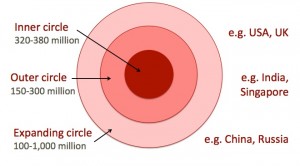“Always do what scares you” has been my mantra for most of my adult life, although to be honest I do have some exemption clauses relating to not wanting to break bones, die, or go anywhere near a snake. Intellectually though, it’s a decent rule to live by, as getting stuck in a comfortable rut is a really bad idea (especially as an academic, as I discovered to my cost). So, when I was invited to teach a course on how to write and publish scientific papers, I said yes, even though it wasn’t something I’d ever done formally, it was way outside my comfort zone, and I had a feeling that my luminous insights might possibly be more akin to irrational rants about things that really irritated me in other people’s writing. Fortunately, I have a good friend who has done this sort of thing very well indeed for years. Vivian Siegel is not only a science communications guru but also very generous, and she kindly armed me with materials and advice well beyond the call of friendship (which is all a far too convoluted way of saying many thanks, Vivian!).
What does one put in a course about science writing? There are a lot of books out there on the subject (the one I used most was Mimi Zeiger’s, and for general advice on style, Strunk and White is unbeatable as well as entertaining), but one definitely needs a guide to navigate them; one of the most common pieces of advice about writing is to emphasise what’s important, but ironically, it’s hard to get a feel for that by reading a big textbook about writing style. I hope that my two days of haranguing my long-suffering students gave them some helpful tips (more of that below), but teaching is a two-way street, and the course has certainly given me some food for thought, principally about the role of formal written English.
Speakers of English have been defined by the World Englishes scholar Braj Kachru as falling into three circles: the inner circle consists of native speakers from countries such as the UK, the USA, Australia, New Zealand and Canada; the outer circle contains those whose official languages include English, such as India and Singapore, and the expanding circle comprises everyone else speaking English as a foreign language. Obviously, those English speakers in the two outer circles far outnumber those in the centre, yet it is the centre that dictates the written norms of formal English, and imposes them on everyone else.
Coming from a half white/half Chinese mongrel background, I’ve never felt like a culturally imperialist oppressor before, but it suddenly seemed very unfair, speaking to an audience of highly intelligent, literate people, to be telling them that their form of written English did not conform to mine, and therefore needed correcting. And parenthetically, it’s even more unreasonable when journals see fit to impose their dubious “house style”: for example, what right do they have to tell authors they can’t use the word “done” when describing an experiment? Or to rewrite sentences in some standard form which then completely changes their meaning (and even more parenthetically, why can’t I write “which” when I feel like it without the blasted grammar checker underlining it, as it just did?)?
Do we need a Standard Written English? Probably, as unless we want to relegate English to a minority language, we need to have a form that is widely understood. Should the rules of English be allowed to flex a little? Definitely. As long as it’s crystal clear what you mean, you should be free to say it how you like. My definition of “crystal clear” of course means that using words common only to your country, or age group (eg 15 year old girls; wow, they have some really weird words), or era, is out. But from now on, I resolve to be more understanding when I see the first word after a colon capitalised (acceptable in the US; a major punctuation crime in the UK), when “hopefully” is used as an adjective rather than an adverb, and for all but the most egregious examples of the verbalisation of nouns (and by the way, -ize and –ise are both perfectly OK as far as I’m concerned). Just so you know, I’ll fight to the last for the retention of “data” as a plural noun, and nothing, repeat nothing, will tear me from the apostrophe.
So now I’m climbing down from my soapbox (which Wikipedia pleasingly remarks is exemplified in the modern day by a blog) and treating you to my top tips for good science writing. Of course, nothing beats someone teaching you this in person, so if Vivian Siegel isn’t available, get in touch!
1. If you can’t read it out loud without sounding pompous or getting hypoxia, don’t write it.
2. If you think you’ve written something insightful and elegant, you’ll probably have to delete it.
3. The passive voice is actually OK; just don’t overuse it.
4. The harder the concept, the more simple the words should be, but be aware you may have to write quite a lot till it’s all explained. It’s always better to write too much and then cut back.
5. Your writing should never come between you and your reader. Don’t make the reader stop in their tracks because you’ve lost them half way through a ridiculously long sentence, or made a grammatical howler (see 1 and 5).
6. “The”, “a” and prepositions are the trickiest places where usage changes between languages. If English isn’t your first language, get a native speaker to check your text.
7. Non-agreement between the singular and plural are the most common writing mistake (did you see what I did there?).
8. Beware of vague introductory sentences – they often say the same thing as the next sentence, just in fluffier terms. Amalgamate or dump – you just sound like you’re waffling.
9. Find a critical reader and pay attention to them, however unpleasant it is. And never give them a rough draft unless you want to really annoy them.
10. Never forget you have an audience, and shape your work according to who they are.
I’d like to thank my students at LKCMedicine, Nanyang Technological University, Singapore, for their patience, enthusiasm, and insight. I hope it wasn’t too painful…



Discussion
No comments yet.